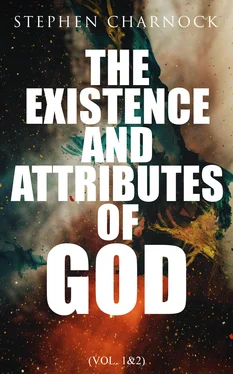Stephen Charnock - The Existence and Attributes of God (Vol. 1&2)
Здесь есть возможность читать онлайн «Stephen Charnock - The Existence and Attributes of God (Vol. 1&2)» — ознакомительный отрывок электронной книги совершенно бесплатно, а после прочтения отрывка купить полную версию. В некоторых случаях можно слушать аудио, скачать через торрент в формате fb2 и присутствует краткое содержание. Жанр: unrecognised, на английском языке. Описание произведения, (предисловие) а так же отзывы посетителей доступны на портале библиотеки ЛибКат.
- Название:The Existence and Attributes of God (Vol. 1&2)
- Автор:
- Жанр:
- Год:неизвестен
- ISBN:нет данных
- Рейтинг книги:3 / 5. Голосов: 1
-
Избранное:Добавить в избранное
- Отзывы:
-
Ваша оценка:
- 60
- 1
- 2
- 3
- 4
- 5
The Existence and Attributes of God (Vol. 1&2): краткое содержание, описание и аннотация
Предлагаем к чтению аннотацию, описание, краткое содержание или предисловие (зависит от того, что написал сам автор книги «The Existence and Attributes of God (Vol. 1&2)»). Если вы не нашли необходимую информацию о книге — напишите в комментариях, мы постараемся отыскать её.
The Existence and Attributes of God (Vol. 1&2) — читать онлайн ознакомительный отрывок
Ниже представлен текст книги, разбитый по страницам. Система сохранения места последней прочитанной страницы, позволяет с удобством читать онлайн бесплатно книгу «The Existence and Attributes of God (Vol. 1&2)», без необходимости каждый раз заново искать на чём Вы остановились. Поставьте закладку, и сможете в любой момент перейти на страницу, на которой закончили чтение.
Интервал:
Закладка:
2. It is a denying of God (Job xxxi. 26–28): “If I beheld the sun when it shined, or the moon walking in its brightness, and my heart hath been secretly enticed, or my mouth hath kissed my hand; this also were iniquity to be punished by the judge, for I should have denied the Lord above.” This denial of God is not only the act of an open idolater, but the consequent of a secret confidence, and immoderate joy in worldly goods. This denial of God is to be referred to ver. 24, 25. When a man saith to gold, “Thou art my confidence,” and rejoices because his wealth is great; he denies that God which is superior to all those, and the proper object of trust. Both idolatries are coupled here together; that which hath wealth and that which hath those glorious creatures in heaven for its object. And though some may think it a light sin, yet the crime being of deeper guilt, a denial of God, deserves a severer punishment, and falls under the sentence of the just Judge of all the earth, under that notion which Job intimates in those words, “This also were an iniquity to be punished by the Judge.” The kissing the hand to the sun, moon, or any idol, was an external sign of religious worship among those and other nations. This is far less than an inward hearty confidence, and an affectionate trust. If the motion of the hand be, much more the affection of the heart to an excrementitious creature, or a brutish pleasure, is a denial of God, and a kind of an abjuring of him, since the supreme affection of the soul is undoubtedly and solely the right of the Sovereign Creator, and not to be given in common to others, as the outward gesture may in a way of civil respect. Nothing that is an honor peculiar to God can be given to a creature, without a plain exclusion of God to be God; it being a disowning the rectitude and excellency of his nature. If God should command a creature such a love, and such a confidence in anything inferior to him, he would deny himself his own glory, he would deny himself to be the most excellent being. Can the Romanists be free from this, when they call the cross spem unicam , and say to the Virgin, In te Domina speravi , as Bonaventure? &c. Good reason, therefore, have worldlings and sensualists, persons of immoderate fondness to anything in the world, to reflect upon themselves; since though they own the being of God, they are guilty of so great disrespect to him, that cannot be excused from the title of an unworthy atheism; and those that are renewed by the spirit of God, may here see ground of a daily humiliation for the frequent and too common excursions of their souls in creature confidences and affections, whereby they fall under the charge of an act of practical atheism, though they may be free from a habit of it.
Thirdly, Man would make himself the end of all creatures. Man would sit in the seat of God, and set his heart as the heart of God, as the Lord saith of Tyrus (Ezek. xxviii. 2). What is the consequence of this, but to be esteemed the chief good and end of other creatures? a thing that the heart of God cannot but be set upon, it being an inseparable right of the Deity, who must deny himself if he deny this affection of the heart. Since it is the nature of man, derived from his root, to desire to be equal with God, it follows that he desires no creature should be equal with him, but subservient to his ends and his glory. He that would make himself God, would have the honor proper to God. He that thinks himself worthy of his own supreme affection, thinks himself worthy to be the object of the supreme affection of others. Whosoever counts himself the chiefest good and last end, would have the same place in the thoughts of others. Nothing is more natural to man than a desire to have his own judgment the rule and measure of the judgments and opinions of the rest of mankind. He that sets himself in the place of the prince, doth, by that act, challenge all the prerogatives and dues belonging to the prince; and apprehending himself fit to be a king, apprehends himself also worthy of the homage and fealty of the subjects. He that loves himself chiefly, and all other things and persons for himself, would make himself the end of all creatures. It hath not been once or twice only in the world that some vain princes have assumed to themselves the title of gods, and caused divine adorations to be given to them, and altars to smoke with sacrifices for their honor. What hath been practised by one, is by nature seminally in all; we would have all pay an obedience to us, and give to us the esteem that is due to God. This is evident,
1. In pride. When we entertain a high opinion of ourselves, and act for our own reputes, we dispossess God from our own hearts; and while we would have our fame to be in every man’s mouth, and be admired in the hearts of men, we would chase God out of the hearts of others, and deny his glory a residence anywhere else, that our glory should reside more in their minds than the glory of God; that their thoughts should be filled with our achievements, more than the works and excellency of God, with our image, and not with the divine. Pride would paramount God in the affections of others, and justle God out of their souls; and by the same reason that man doth thus in the place where he lives, he would do so in the whole world, and press the whole creation from the service of their true Lord, to his own service. Every proud man would be counted by others as he counts himself, the highest, chiefest piece of goodness, and be adored by others, as much as he adores and admires himself. No proud man, in his self‑love, and self‑admiration, thinks himself in an error; and if he be worthy of his own admiration, he thinks himself worthy of the highest esteem of others, that they should value him above themselves, and value themselves only for him. What did Nebuchadnezzar intend by setting up a golden image, and commanding all his subjects to worship it, upon the highest penalty he could inflict, but that all should aim only at the pleasing his humor?
2. In using the creatures contrary to the end God has appointed. God created the world and all things in it, as steps whereby men might ascend to a prospect of him, and the acknowledgment of his glory; and we would use them to dishonor God, and gratify ourselves: he appointed them to supply our necessities, and support our rational delights, and we use them to cherish our sinful lusts. We wring groans from the creature in diverting them from their true scope to one of our own fixing, when we use them not in his service, but purely for our own, and turn those things he created for himself, to be instruments of rebellion against him to serve our turns, and hereby endeavor to defeat the ends of God in them, to establish our own ends by them: this is a high dishonor to God, a sacrilegious undermining of his glory, 264to reduce what God hath made to serve our own glory and our own pleasure; it perverts the whole order of the world, and directs it to another end than what God hath constituted, to another intention contrary to the intention of God; and thus man makes himself a God by his own authority. As all things were made by God, so they are for God; but while we aspire to the end of the creation, we deny and envy God the honor of being Creator; we cannot make ourselves the chief end of the creatures against God’s order, but we imply thereby that we were their first principle; for if we lived under a sense of the Creator of them while we enjoy them for our use, we should return the glory to the right owner. This is diabolical; though the devil, for his first affecting an authority in heaven, has been hurled down from the state of an angel of light into that of darkness, vileness, and misery, to be the most accursed creature living, yet he still aspires to mate God, contrary to the knowledge of the impossibility of success in it. Neither the terrors he feels, nor the future torments he doth expect, do a jot abate his ambition to be competitor with his Creator; how often hath he, since his first sin, arrogated to himself the honor of a God from the blind world, and attempted to make the Son of God, by a particular worship, count him as the “chiefest good and benefactor of the world!” 265Since all men by nature are the devil’s children, the serpent’s seed, they have something of this venom in their natures, as well as others of his qualities. We see that there may be, and is a prodigious atheism, lurking under the belief of a God; the devil knows there is a God, but acts like an atheist; and so do his children.
Читать дальшеИнтервал:
Закладка:
Похожие книги на «The Existence and Attributes of God (Vol. 1&2)»
Представляем Вашему вниманию похожие книги на «The Existence and Attributes of God (Vol. 1&2)» списком для выбора. Мы отобрали схожую по названию и смыслу литературу в надежде предоставить читателям больше вариантов отыскать новые, интересные, ещё непрочитанные произведения.
Обсуждение, отзывы о книге «The Existence and Attributes of God (Vol. 1&2)» и просто собственные мнения читателей. Оставьте ваши комментарии, напишите, что Вы думаете о произведении, его смысле или главных героях. Укажите что конкретно понравилось, а что нет, и почему Вы так считаете.












